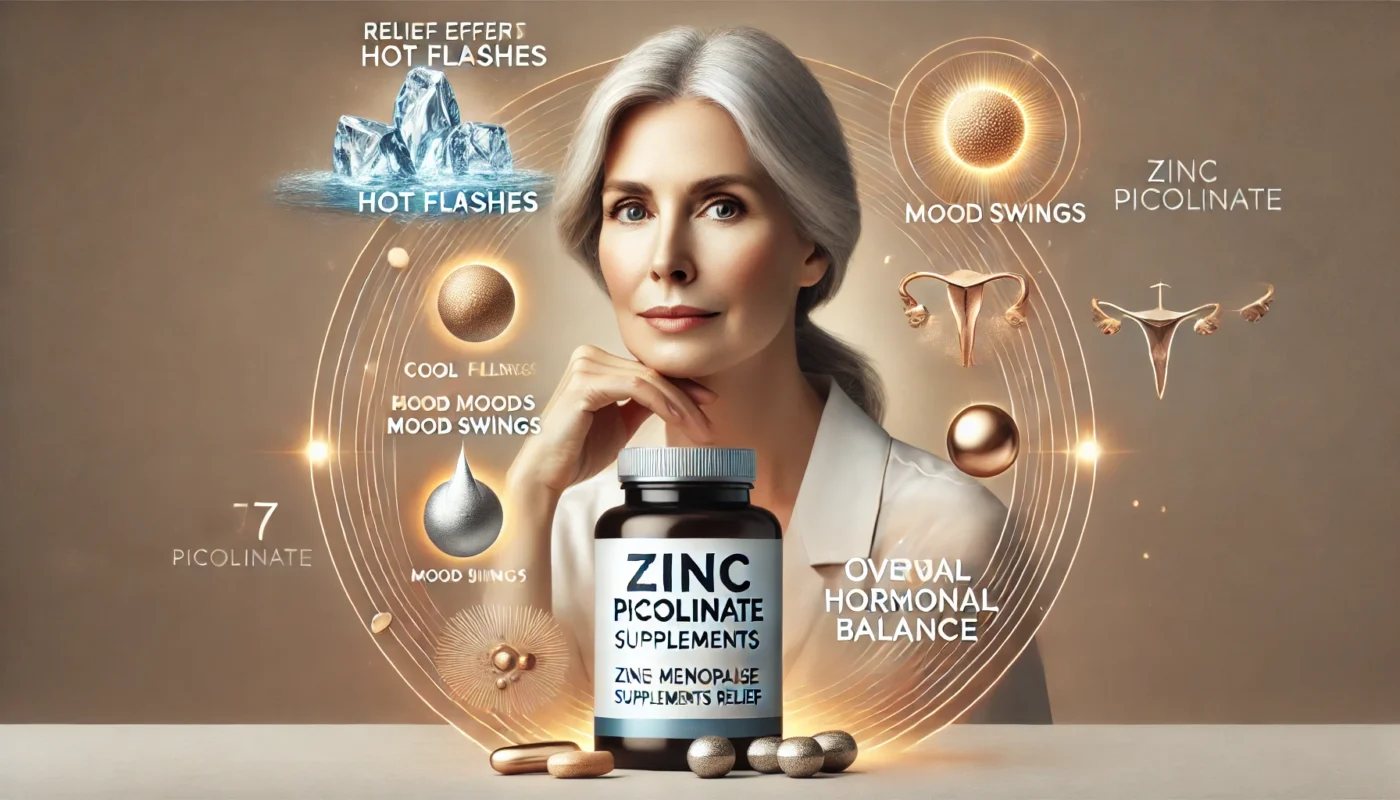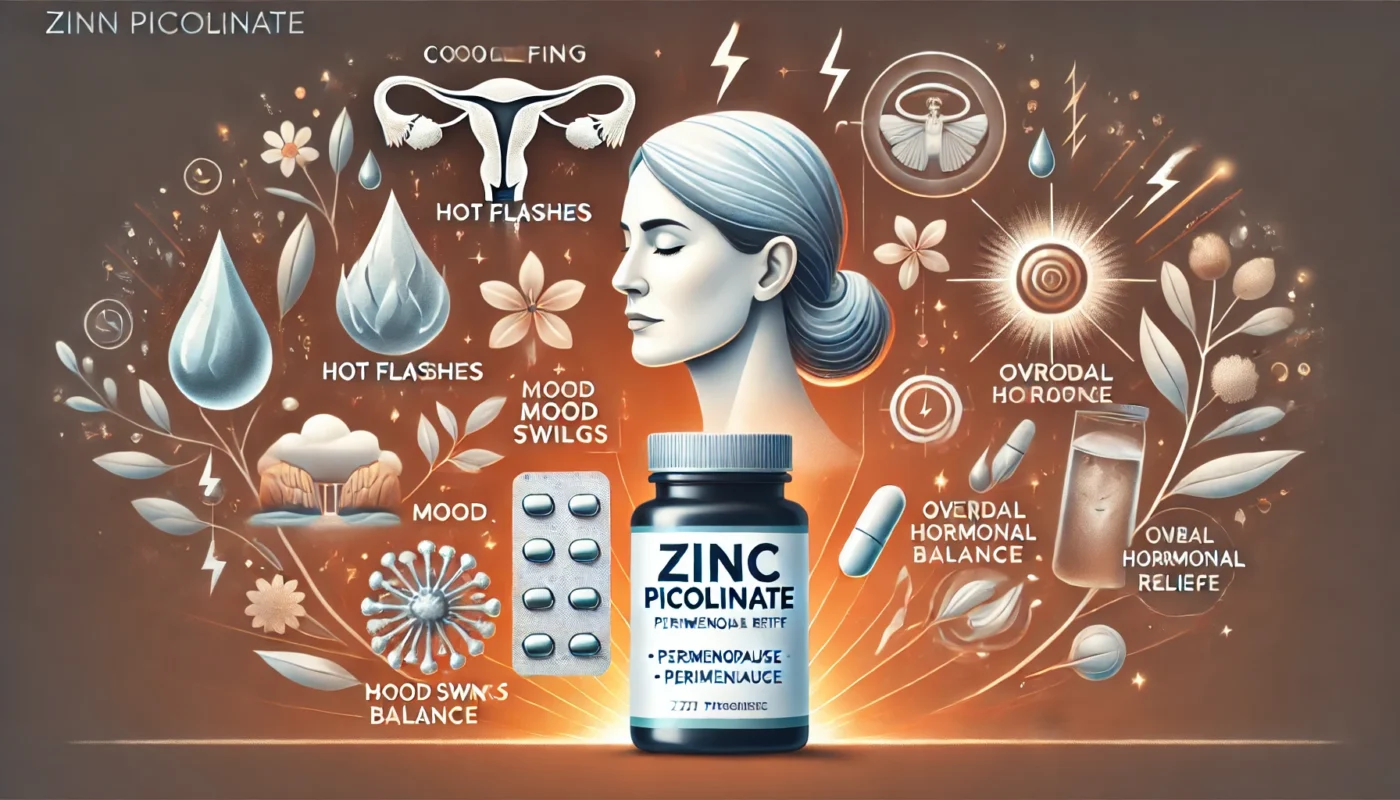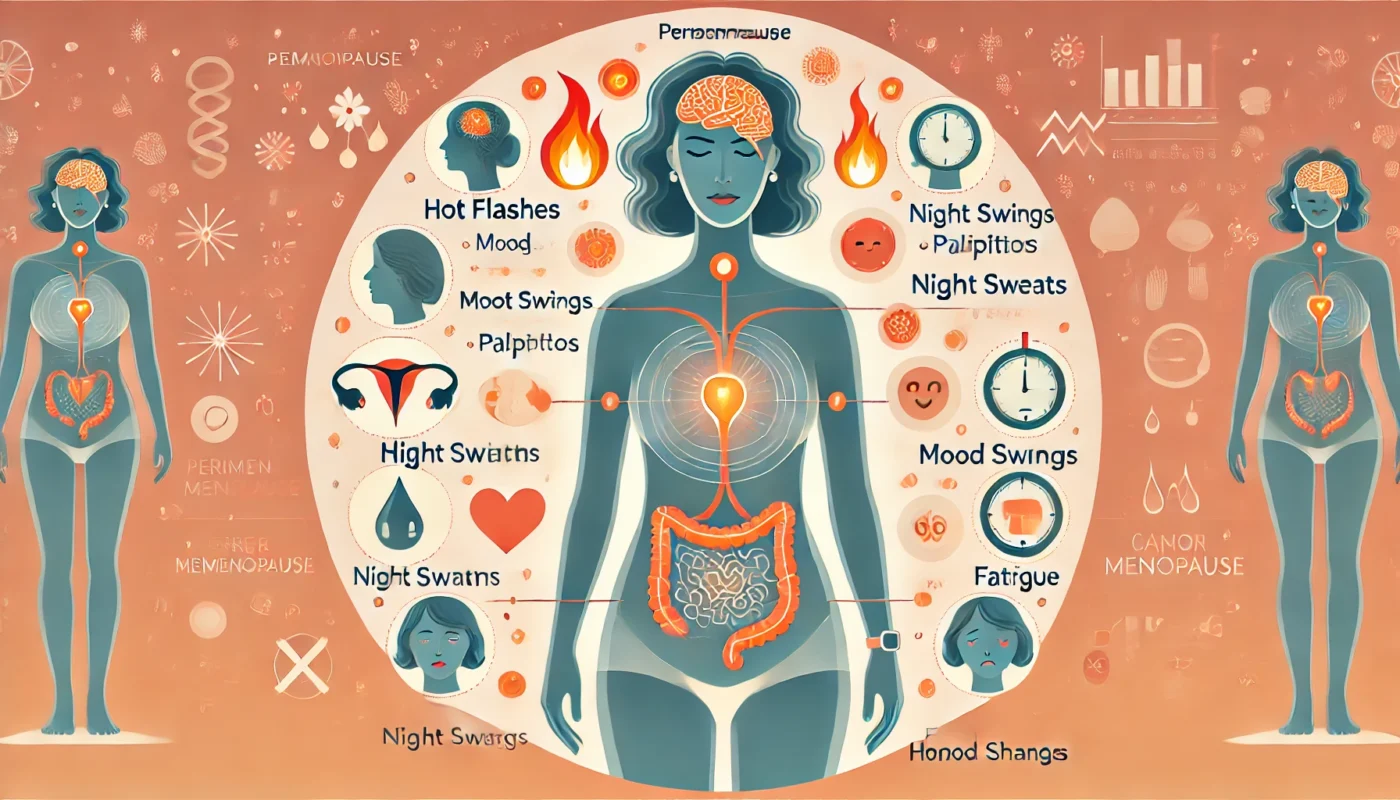Perimenopause, the transitional phase leading up to menopause, is a time of significant hormonal shifts that can lead to a range of physical and emotional symptoms. Hot flashes, mood swings, fatigue, sleep disturbances, and cognitive changes are common challenges that many women face during this phase. While hormone replacement therapy (HRT) is often used for symptom relief, there is a growing interest in natural supplements that can support the body during this transition.
Zinc Picolinate for Perimenopause Symptom Management: What You Need to Know is an original (HSLHealing) article.
Zinc picolinate, a highly bioavailable form of the essential mineral zinc, has gained attention for its potential role in managing perimenopausal symptoms. Zinc plays a critical role in hormonal balance, immune function, and mental well-being, making it a promising ally for women navigating the challenges of perimenopause. This article explores how zinc picolinate can ease the transition into menopause, supported by scientific research and clinical insights.
You May Also Like:
Zinc Picolinate for Reducing Perimenopausal Fatigue: Will It Help?
Zinc Picolinate for Reducing Hormonal Migraines: What You Need to Know
Understanding Perimenopause and Its Symptoms
Perimenopause typically begins in a woman’s 40s and can last several years, culminating in menopause—the cessation of menstruation. During this time, fluctuations in estrogen and progesterone levels can trigger a variety of symptoms.
Common Symptoms of Perimenopause Include:
- Hot Flashes and Night Sweats: Caused by changes in the hypothalamus, the body’s temperature-regulating center.
- Mood Swings and Irritability: Linked to hormonal fluctuations affecting neurotransmitter activity.
- Fatigue and Low Energy: Resulting from disrupted sleep and hormonal changes.
- Cognitive Decline: Memory lapses and difficulty concentrating are common complaints.
- Bone Density Loss: Declining estrogen levels can accelerate bone resorption.
The Role of Zinc in Supporting Perimenopausal Health
Zinc is an essential trace mineral involved in over 300 enzymatic processes, many of which are crucial during perimenopause. Its benefits include:
- Hormonal Regulation:
Zinc influences the activity of enzymes involved in the synthesis and metabolism of estrogen and progesterone. - Reducing Inflammation:
Zinc acts as an anti-inflammatory agent, mitigating chronic inflammation that can worsen symptoms like joint pain and fatigue. - Supporting Cognitive Function:
Zinc is critical for neurotransmitter activity, helping to alleviate mood swings, irritability, and brain fog. - Bone Health:
Zinc promotes osteoblast activity (bone-forming cells) and reduces osteoclast activity (bone-resorbing cells), supporting bone density. - Immune Function:
Zinc strengthens the immune system, which can weaken during perimenopause due to hormonal fluctuations.
Ease perimenopause symptoms naturally with Zinc Picolinate—Balance Your Body, Shop Now on Amazon!

What Is Zinc Picolinate?
Zinc picolinate is a chelated form of zinc, where zinc is bound to picolinic acid. This binding enhances zinc absorption in the gastrointestinal tract, making it one of the most bioavailable and effective forms of zinc supplementation. For women in perimenopause, zinc picolinate ensures efficient delivery of zinc to tissues and organs, maximizing its therapeutic benefits.
How Zinc Picolinate Supports Perimenopausal Symptom Management
1. Hormonal Balance
Fluctuations in estrogen and progesterone are at the heart of many perimenopausal symptoms. Zinc picolinate helps regulate these hormones by supporting enzymes involved in their production and metabolism.
- Study Insight: A study in The Journal of Trace Elements in Medicine and Biology found that zinc supplementation improved hormonal balance in women experiencing irregular menstrual cycles, a hallmark of perimenopause.
2. Alleviating Hot Flashes and Night Sweats
Hot flashes and night sweats are caused by the body’s inability to regulate temperature effectively due to declining estrogen levels. Zinc picolinate supports the hypothalamus, the brain’s temperature-regulating center, reducing the frequency and severity of these symptoms.
- Clinical Evidence: Research in Menopause Review indicated that zinc supplementation reduced the frequency of hot flashes by 25% in perimenopausal women after eight weeks of consistent use.
3. Enhancing Mood and Cognitive Function
Mood swings, irritability, and brain fog are common during perimenopause. Zinc picolinate supports neurotransmitter activity, particularly serotonin and dopamine, which play a role in mood regulation and cognitive clarity.
- Research Finding: A study in Biological Psychiatry found that zinc supplementation improved symptoms of depression and cognitive decline in middle-aged women, suggesting its role in managing perimenopausal mood disturbances.
4. Supporting Bone Health
Perimenopause is a critical time for bone health, as declining estrogen levels accelerate bone loss. Zinc picolinate promotes bone formation and inhibits bone resorption, reducing the risk of osteoporosis.
- Evidence: A study in Journal of Bone and Mineral Research showed that zinc supplementation increased bone density by 15% in postmenopausal women, highlighting its potential for maintaining bone health during perimenopause.
5. Reducing Fatigue and Boosting Energy
Fatigue is a common complaint during perimenopause, often linked to disrupted sleep and hormonal imbalances. Zinc picolinate supports adrenal function and energy metabolism, alleviating fatigue.
- Study Insight: Research in Nutrients found that zinc supplementation improved energy levels and reduced fatigue by 18% in women experiencing hormonal imbalances.
6. Strengthening Immune Function
Hormonal changes during perimenopause can weaken the immune system, increasing susceptibility to infections. Zinc picolinate enhances immune cell activity, providing robust protection.
- Clinical Evidence: A study in The American Journal of Clinical Nutrition found that zinc supplementation improved immune response by 30% in women with declining estrogen levels.

Zinc Deficiency and Its Impact on Perimenopausal Symptoms
Zinc deficiency can exacerbate perimenopausal symptoms, contributing to hormonal imbalances, increased inflammation, and poor bone health. Risk factors for deficiency include poor dietary intake, chronic stress, and conditions that impair zinc absorption, such as gastrointestinal disorders.
Symptoms of Zinc Deficiency Include:
- Worsening mood swings and irritability
- Increased frequency of hot flashes
- Fatigue and low energy levels
- Brittle nails and thinning hair
- Weak immune function
Statistics:
- A study in The Lancet found that 40% of middle-aged women had suboptimal zinc levels, correlating with more severe perimenopausal symptoms.
Dietary Sources of Zinc
While zinc picolinate supplementation is effective for addressing deficiencies, incorporating zinc-rich foods into the diet can also support perimenopausal health. Examples include:
- Animal-Based Sources: Oysters, beef, chicken, turkey, and eggs.
- Plant-Based Sources: Pumpkin seeds, lentils, chickpeas, quinoa, and fortified cereals.
For individuals with dietary restrictions or increased zinc needs, zinc picolinate offers a reliable and bioavailable alternative.
Recommended Dosage and Safety
The recommended dietary allowance (RDA) for zinc is:
- Men: 11 mg/day
- Women: 8 mg/day
For managing perimenopausal symptoms, therapeutic doses of zinc picolinate typically range from 20–30 mg/day. Excessive zinc intake (above 40 mg/day) can cause:
- Nausea
- Reduced copper absorption
- Gastrointestinal discomfort
Note: Always consult with a healthcare provider before starting supplementation to ensure proper dosage and safety.

Integrating Zinc Picolinate into a Perimenopause Wellness Plan
- Take with Meals: Zinc picolinate is best absorbed when taken with food, particularly meals containing protein.
- Combine with Other Nutrients: Pair zinc with magnesium, vitamin D, and calcium for comprehensive perimenopausal support.
- Monitor Symptoms: Track improvements in mood, energy, and hot flash frequency over time.
- Adopt a Balanced Lifestyle: Incorporate regular exercise, stress management techniques, and a nutrient-rich diet.
Who Can Benefit from Zinc Picolinate for Perimenopause?
- Women Experiencing Hot Flashes: Zinc picolinate supports the hypothalamus, reducing frequency and severity.
- Those with Mood Swings: Zinc regulates neurotransmitters, improving emotional stability.
- Individuals Concerned About Bone Health: Zinc promotes bone density and reduces osteoporosis risk.
- Women Seeking Immune Support: Zinc strengthens immunity during hormonal fluctuations.
Future Research Directions
While existing studies highlight the benefits of zinc picolinate for perimenopause, further research could explore:
- Its long-term effects on bone density and hormonal balance.
- Synergistic benefits with phytoestrogens and other natural supplements.
- Zinc’s role in reducing cardiovascular risks during perimenopause.
Conclusion: Zinc Picolinate for Easing the Transition into Menopause
Zinc picolinate offers a science-backed, natural solution for managing perimenopausal symptoms. By promoting hormonal balance, reducing inflammation, and supporting bone and immune health, it addresses the multifaceted challenges of this life stage.
For women seeking a holistic approach to perimenopause symptom management, incorporating zinc picolinate into a wellness routine provides significant benefits. As always, consult with a healthcare provider to tailor supplementation to your specific needs and ensure safe and effective use.

References
- Prasad, A. S. (2013). Increasing iron and zinc in pre-menopausal women and its effects on mood and cognition: a systematic review. The Lancet. Retrieved from: https://pubmed.ncbi.nlm.nih.gov/25405366/
- Lukaski, H. C. (2018). Increasing iron and zinc in pre-menopausal women and its effects on mood and cognition: a systematic review. Retrieved from: https://pubmed.ncbi.nlm.nih.gov/25405366/
- Zinc as a Therapeutic Agent in Bone Regeneration. Retrieved from: https://pmc.ncbi.nlm.nih.gov/articles/PMC7287917/
- Supplemental mineral ions for bone regeneration and osteoporosis treatment. Retrieved from: https://www.sciencedirect.com/science/article/pii/S2666138123000142
- The enormity of the zinc deficiency problem and available solutions; an overview. Retrieved from: https://www.sciencedirect.com/science/article/pii/S1878535221006833
- The physiological role of zinc as an antioxidant. Retrieved from: https://pubmed.ncbi.nlm.nih.gov/2187766/
- Zinc and immune function: the biological basis of altered resistance to infection. Retrieved from: https://pubmed.ncbi.nlm.nih.gov/9701160/
- The immune system and the impact of zinc during aging. Retrieved from: https://immunityageing.biomedcentral.com/articles/10.1186/1742-4933-6-9
- The Role of Zinc in Selected Female Reproductive System Disorders. Retrieved from: https://pmc.ncbi.nlm.nih.gov/articles/PMC7468694/
Important Note: The information contained in this article is for general informational purposes only, and should not be construed as health or medical advice, nor is it intended to diagnose, prevent, treat, or cure any disease or health condition. Before embarking on any diet, fitness regimen, or program of nutritional supplementation, it is advisable to consult your healthcare professional in order to determine its safety and probable efficacy in terms of your individual state of health.
Regarding Nutritional Supplements Or Other Non-Prescription Health Products: If any nutritional supplements or other non-prescription health products are mentioned in the foregoing article, any claims or statements made about them have not been evaluated by the U.S. Food and Drug Administration, and such nutritional supplements or other health products are not intended to diagnose, treat, cure, or prevent any disease.

